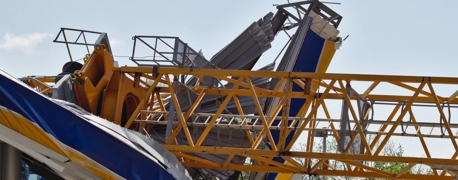Be Prepared with a Worksite Emergency Checklist

Are you prepared for an emergency? When your spouse is away at work, it’s important to have all the information you’d need readily available should something happen at the worksite. This isn’t just phone numbers, so take the time to gather everything and put it in an easily accessible place.
In this blog, we will share a list of everything families need to have in case of an emergency at the worksite, whether their loved one performs duties on an offshore oil rig, at an industrial refinery, or on the road as a trucker.
What Information Do Spouses Need?
The best way to get ahead of an emergency is by having a binder with up-to-date information. At the front of this binder, make sure to keep a table of contents of everything that is included to ensure it’s easy to use.
Your emergency information binder should include:
- Your spouse’s name. This may be obvious, but in case you need to hand over a pile of information to the authorities, it’s best to note your spouse’s legal name in their binder. Plus, if you are keeping emergency binders for multiple family members, this can serve as an easy way to tell them apart.
- The name and location of the worksite(s). Although seemingly easy to recall now, even the most mundane facts can be forgotten in a crisis. Many workers move around in their roles, while others stay in one location for an extended period. Keeping track of your spouse’s location can make it easier to contact them or for responders to find them in an emergency.
- The name and contact information of your spouse's boss. Knowing who oversees your spouse’s role – and even going up the food chain to those who run the worksite – can be integral information in an emergency. They may be able to provide more specific information to the authorities.
- The name, location, and contact information for the company’s headquarters. Who is responsible for your spouse’s safety and role at the worksite? Not only is the company responsible, but they should have information about the kind of work that is being performed and whether your spouse could have been affected by a crisis.
- A copy of the contract between your spouse and their employer. Understanding what both sides expect from the job to be done can be incredibly important when something goes wrong.
- Your spouse’s job title and a description of their duties. This can help verify whether they were affected by the emergency. If you have a good understanding of their work duties, you will be better prepared to address matters in a critical situation.
- The names and contact info of your spouse’s peers. This should also include their peers’ spouses’ information; staying connected with people in your position can help you work through the separation even when there isn’t an emergency to handle!
- Emergency information the company provided at hiring. Make sure this is up to date! Going through official channels to check on your spouse in an emergency can be one of the quickest ways to get answers.
- Copies of legal documents such as a living will and power of attorney (POA). Attorneys help create these documents, and oftentimes, it is less expensive and easier to do than you’d think. In a critical situation, these documents will communicate the wishes of you and your partner, and help you navigate a very complicated situation if an accident occurs.
- The names and locations of any hospitals that your spouse would be taken to in the event of an emergency. This will narrow down the search for your spouse should you find that they’ve been taken in for treatment after an accident. Keeping this list will also remove any need to remember or dig up this information in the heat of the moment.
- Vehicle records and driving certifications. Does your spouse drive a company vehicle for work each day? Keep vehicle information like the make, model, condition of the vehicle, and occasional photographs, noting any problems you’ve reported to the company about the vehicle. This will serve as supporting evidence for law enforcement or attorneys in case of an accident. Plus, be sure to check with your insurance company to learn what coverage is needed for your situation.
Representing Injured Workers & Their Families
At Arnold & Itkin, we prioritize getting answers for workers and their spouses. When the worst happens, being prepared can make the recovery process a little easier. Having a team of work injury lawyers on your side can help get you and your family the representation and justice you deserve. Contact Arnold & Itkin to learn more about your options!
- Categories


